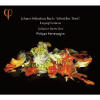Texte paru dans: / Appeared in:
*

GRAMOPHONE (02/2013)
Pour s'abonner /
Subscription information
PHI
LPH006

5400439000063 (ID280)
Consultez toutes les évaluations recensées pour ce cd
~~~~ Reach all the evaluations located for this CD

Reviewer:
First Bach cantatas for Herreweghe’s own label
Philippe Herreweghe has always meticulously hand-picked Bach cantatas (previously with both Virgin and Harmonia Mundi), resisting the completist route and recording micro-series which focus on particular conceits, often reflecting the conductor’s special interest in the poignant rhetorical richness of the motet-inspired worlds — though not exclusively.
This latest recording represents the first cantata disc on the PHI label and is arguably the finest in Herreweghe’s recent Bach output. Each of these four works is a five-star cantata, two of which he has recorded previously. No one could argue with a repeat visit to the wonders of BWV105 but his latest interpretation of BWV13 8 appears uncannily similar in approach to his earlier reading, although Peter Kooij lacks some of the old resonance. Herreweghe perhaps subliminally compensates with a pointed über-elegance. Thomas Hobbs movingly delivers the opening lines of this work (the previous recording employs all the tenors) with mournful chromaticism harnessed to embracing discipleship — a sentiment which one of his teachers, Jan Partridge, imparted for Ernst Ansermet in ‘Kann ich nur’ in BWV105 and to which Hobbs is the equal here.
The framing cantatas, BWV25 and 46, are deliciously tinged with sadness — aided and abetted by evocative and sensual recorder-playing. Especially in BWV25, Collegium Vocale Gent create the most ravishing of luminescent textures: antico introspection guides the counterpoint with refinement and a glowing homogeneity between singers and instruments. Perfect balance is found here and Hana B1ažiková’s sparkling singing contributes to a memorable account.
For a work as universally admired as BWV1O5, there are surprisingly few satisfying recordings; but both Herreweghe’s versions from 1991 and 2012 are among the very best. If there is more purpose and declamation in the later version, there is perhaps less of the organic mystery which defines the best of his early work. However, I defy anyone to find a more deploring and anguished reading of ‘Wie zittern’, with oboist Marcelle Ponseele performing the obbligato oboe even more exquisitely than before. This is a reading of experience and great beauty: quite simply a ‘must-have’ for Bach lovers.
Jonathan Freeman-Attwood
Cliquez l'un ou l'autre
bouton pour découvrir bien d'autres critiques de CD
Click either button for many other reviews


